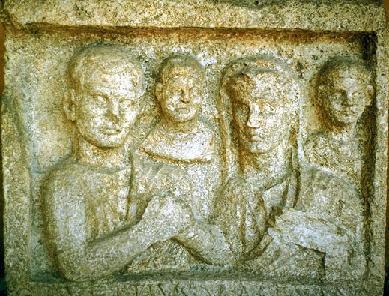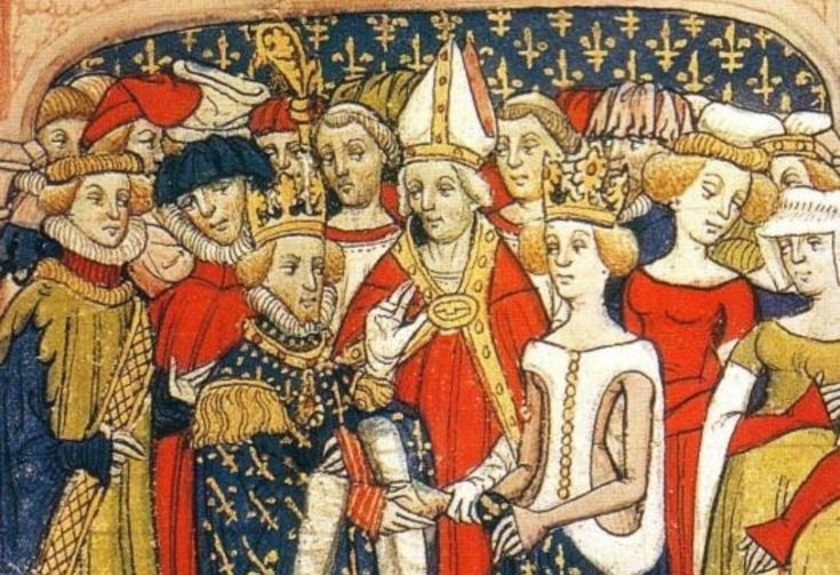I recently saw a conversation on Twitter about whether or not husbands and wives are equal. It is a fair question. The consensus of the modern world is that men and women are completely equal with the exception of different sex organs. Thus, moderns conclude that there are no set roles in a marriage. But is that really the case?
Gender Roles in the Western Tradition
I want to clear up one point. One person on Twitter argued that the headship of a husband in marriage was something foreign to the Western tradition. His argument was that the idea of the husband being the head of the wife came from Semitic influences—namely Christianity.
In the mind of this person, the concept of a wife being submissive to her husband was something more compatible with Islam than pagan Europe. Modern egalitarianism is therefore a return to what Europeans had prior to the rise of Christianity.
There are a few mistakes in his reasoning.
The Testimony of History

First, Christianity is not some foreign imposition upon Europe. Rather, Europe is the result of Christianity appropriating those elements of pagan culture which are true, and raising and transforming them. Without Christianity there would be no Europe as we know it.
The creation of chivalry is an example of this. The fusion of the Germanic warrior tradition with Christianity gave rise to an institution that quickens the pulse of every true man and woman to this day.
The second mistake is that it does not take all of European history into account. The Greeks and Romans were patriarchal societies. This is best illustrated by the Roman institution of pater familias. What this meant was that the oldest male in the household had complete control of the rest of family. Definitely a far cry from modern equality!
With the Germanic tribes we have less information, but they were patriarchal as well, although less so than the Romans. Women had no political station of their own. They either inherited their station from their father or their husband. On the other hand, Tacitus writes that a wife comes to her husband,
As a partner in toils and dangers; to suffer and to dare equally with him, in peace and in war.
This is not modern egalitarianism. Rather, it approaches the idea of Christian marriage.
Christian Marriage

In Christian marriage, the husband and wife are equal in the sense that they are equal in dignity. The wife is not somehow “lower” or of less value than her husband. But husband and wife have different roles.
Unfortunately, the full teaching about Christian marriage flies directly contrary to modern society. Pastors and priests are either too lazy or too afraid to teach it so it is little known among the faithful. The sticking point is St. Paul’s admonition in Ephesians 5:22-23.
Let women be subject to their husbands as to the Lord, because the husband is the head of the wife, and Christ is the head of the Church.
We have to be clear that this not the leadership that we envision in the secular world. Biblical headship does not involve the wife being treated like an employee or a child. Instead, Christian leadership must always be Christ-like: it must be servant leadership.
There are some conditions on husband’s leadership role:
- It cannot take away the wife’s liberty and dignity.
- It must recognize the wife’s lofty position “as wife and mother and companion.” (Casti Connubi)
- The husband cannot ask the wife to do something that is immoral or contrary to reason.
- If the husband rejects Christianity or embraces an erroneous form of it, he loses his authority in spiritual matters. For example, if the husband converts to Islam, his wife is in no way required to follow him in his error.
- If the husband fails in his duties toward the family, it is up to the wife to take action to protect the family.
Finally, this needs to be put in the context of what Paul says afterward: “husbands should love their wives as they do their own bodies.” (Eph. 5:27)
Where does egalitarianism come from?
If modern egalitarianism does not come from the European tradition, where does it come from?
It actually has its roots in the Enlightenment. But the equality of the Enlightenment was mostly focused on eliminating monarchy and aristocracy. It left the patriarchal relationship between husband and wife intact—for a period of time.
The real thrust for equality within marriage came with Marxism. Marxism continued to take Enlightenment doctrine to its logical conclusion and it leveled all inequality, including that between husbands and wives.
According to Marxist teaching, the whole institution of marriage is inherently oppressive to women and needs to be done away with. Frederich Engels wrote:
The modern individual family is founded on the open or concealed domestic slavery of the wife, and modern society is a mass composed of these individual families as its molecules.
While the US and Europe (with the exception of the Eastern Bloc countries) never adopted Marxism directly, its radical egalitarian concepts were introduced into the West through the work of feminists and other cultural revolutionaries. If you look into the lives of the feminists of the 60s and 70s you will find that they were all deeply influenced by Marxist thought.
By the way, these people have not gone away. Radical feminists are continuing their crusade. The egalitarianism of today is just a stepping stone to their ultimate plan which is doing away with marriage entirely.
Conclusion
In summary, patriarchy, not equality, is the ancient European tradition. It does not originate in Christianity, but Christianity put the roles of husband and wife into their proper order.
The spiritual headship of husbands and the submissiveness of wives does not have a good analog in the world. We need to study the example of the life of Christ to understand how it should be lived.
Another wonderful post Michael. Keep up the good work and God bless.
Thanks for writing this.
“In the mind of this person, the concept of a wife being submissive to her husband was something more compatible with Islam than pagan Europe. Modern egalitarianism is therefore a return to what Europeans had prior to the rise of Christianity.”
‘Wife with a Purpose’ brought this up at the recent Christianity Google hangout, as she had observed the same trend. Feminist abuse of pseudo-paganism is laughably ignorant.
Evola is correct in asserting that the woman is subject to man by virtue of her pursuits of true virility, which are dependent upon men (those being the mother and the lover), while men pursue true virility independent of women (the priest and the ascetic). In this regard, women are companions to men and find their identity through men, which is the only way such a thing can be expressed in a correct and non-degenerate manner. A woman’s organic state is thus not to experience her own independent identity, but to orbit the identity of her husband, fulfilling the duties of wifehood and enjoying in particular the richness of children which will bring her unparalleled joy.
I was reading something very interesting recently, from Gu HongMing, a pugnacious advocate of Confucian values and the imperial ideal in early 1900s China. He had been in conversation with a Western woman who asked him “Is it true that the Chinese, like the Mohamedans believe that a woman does not have a soul?”
To which he replied “The Chinese view is not that the woman doesn’t have a soul, but that a true woman, a Chinese woman, doesn’t have a self”
One thing you can most certainly say about feminists, even if they do criticize Patriarchy as a selfish institution, they cannot say that feminism isn’t selfish as it is all about the gratification of the self, which unsurprisingly makes women miserable.